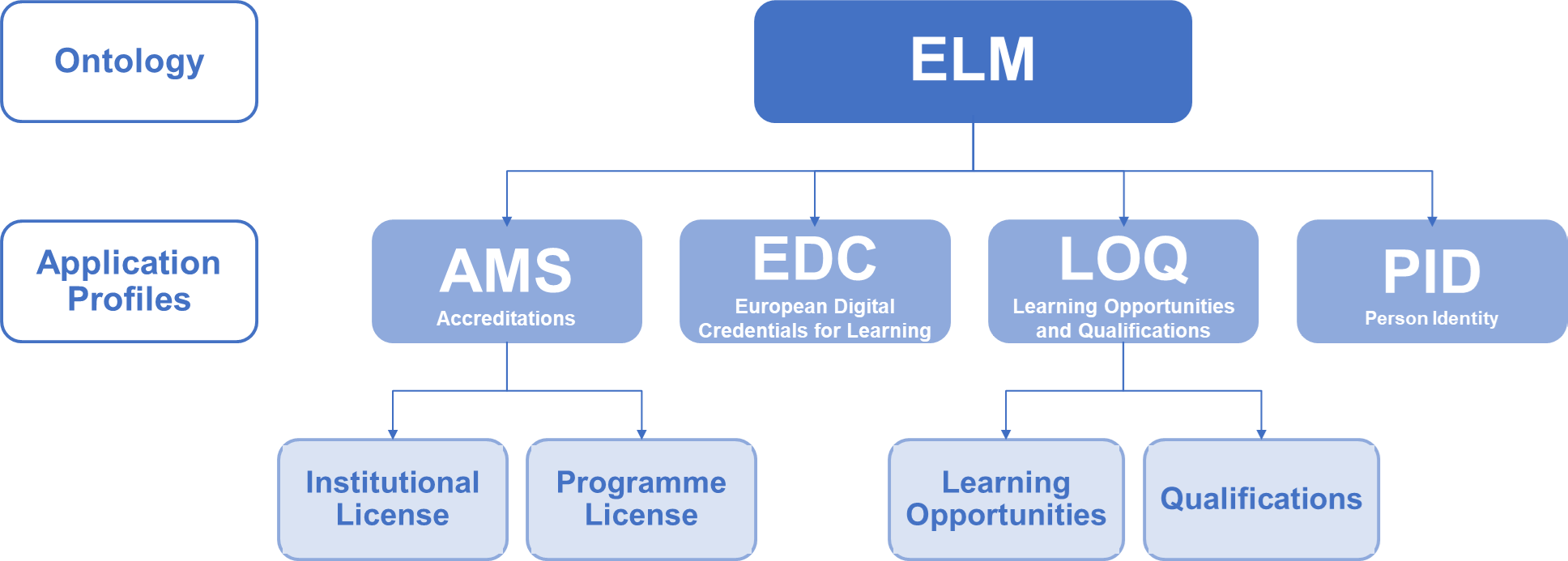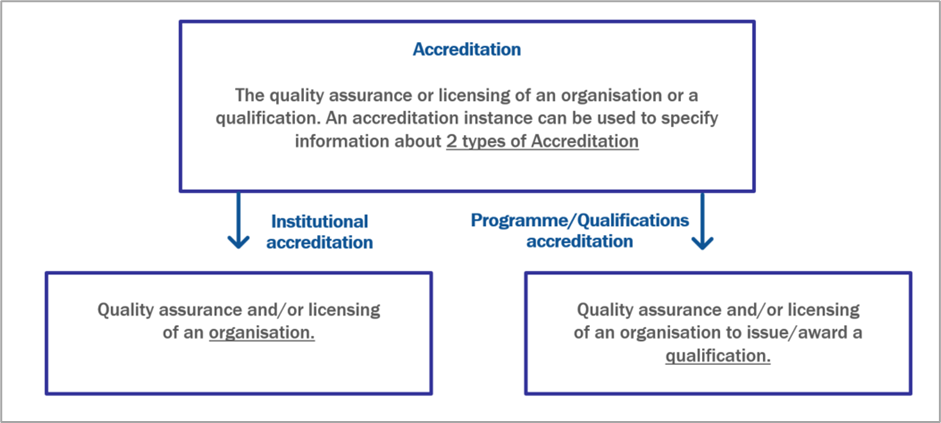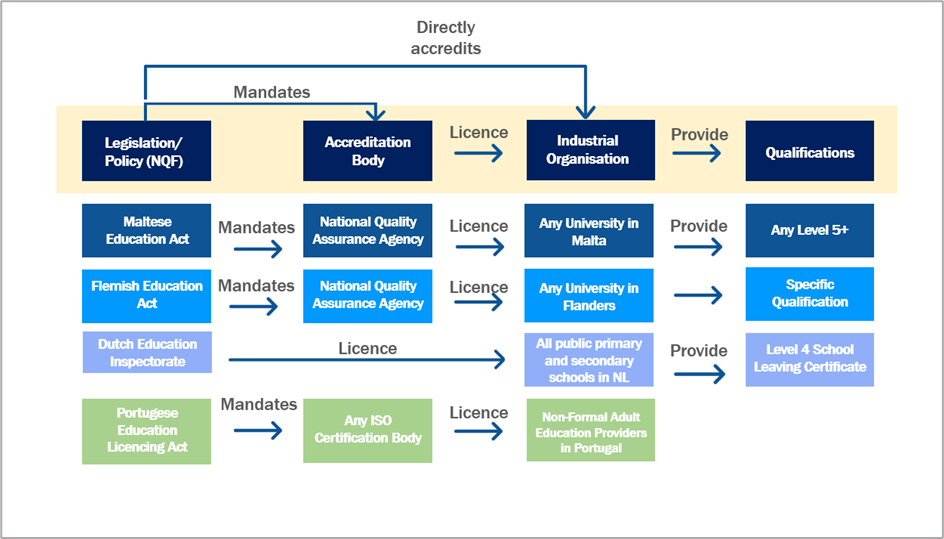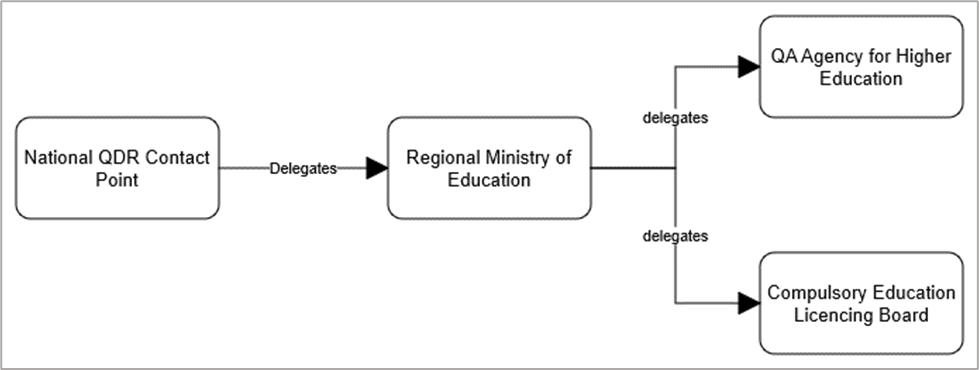Accreditation in the QDR
You will find here the background information to publishing accreditation.
On this page you will find the background information on publishing accreditation. If you are already familiar with Accreditation, you can go directly to publishing to the QDR.
Across Europe, specific qualifications require an accreditation or licence from a government mandated authority to be awarded by an educational or training organisation. The Accreditation database keeps a record of such accreditations and is used to check the authenticity of European Digital Credentials for Learning (EDC). Whenever a credential that requires accreditation is loaded into the EDC viewer, this is checked against the database and the result displayed to the user. This provides individuals and employers with protection against fraudulent education and training institutions and diploma mills.
The accreditation database is being rolled out progressively, starting with pilots in Higher Education.
To define the term accreditation in the context of Europass, the following definition is used:
The quality assurance or licensing of an organisation or a qualification.
An accreditation instance within the ELM context can be used to specify information about two types of accreditations:
- Institutional licencing:
- Quality assurance and/or licensing at the level of an organisation. This implies permission for the institution to:
- operate (e.g. issuing a qualification); and is awarded by public authorities or delegates thereof
(eg. University of Amsterdam is accredited to operate as a university which means it can issue qualifications at EQF Level 5+.)
It can be applied to whole institutions or sub-sections of an institution (such as a faculty or department).
- Programme/qualification accreditation:
- Permission to provide a specific programme or qualification. It describes a licensing procedure applied at the level of one or several programmes/qualifications.
- Programme Licencing implies permission for an institution to:
- provide specific Programmes/Qualifications and is awarded by public authorities or delegates thereof
(eg. University of Rotterdam is accredited to provide a bachelor in Biology. Here the qualification “Bachelor in Biology’’ is accredited.)
In Europass, any qualification part of an NQF (National Qualifications Framework) is considered to be accredited, considering the quality assurance procedures that qualifications that are part of NQF referenced to the EQF go through. These can also be private qualifications or international qualifications.
The importance of Accreditation in Europass is twofold:
- It provides individuals with guarantee that their qualifications have been awarded by Accredited Organisations
- It provides receivers of qualifications (employers, education and training institutions, recognition authorities) with an additional guarantee of the authenticity of awards held by the holders
Examples of accreditation in Europe
As the imaginary example below shows, accreditation in Europe is usually regulated by a legislation or policy that gives mandate to an accreditation body to license an accreditation body. These organisations are accredited to provide specific accreditations.
Individuals can use Europass to record and manage all their learning activities and achievements through life. A European Digital Credential for Learning (EDC) describes a learning achievement. It can describe activities, assessments, and professional entitlements as well as qualifications.
There are two types of digital credentials:
- Accredited credentials: which are awarded by virtue of a permission provided by Public Authorities or delegates thereof (also NQF- qualification awards from providers outside formal education and training, such as international and private qualifications, fall within this category)
- Other credentials: for any other type of learning activity or achievement which do not require a permission to award. Examples can be “a credential for attending this webinar’’, and those could encompass shorter learning experiences for which no formal accreditation applies.
Whenever an accredited European Digital Credential for Learning is presented, the system runs a check against the information stored in the Europass accreditation database to check whether the issuing organisation was indeed accredited to award said qualification. This check is done automatically in seconds and thus avoids administrative work and unnecessary time.

The green tick show that it is an accredited digital credential, when it would be an “other credential’’, the green tick would not appear.
The Application Profiles apply specific sets of rules and restrictions on top of the general ontology to ensure that vital data on learning opportunities (e.g. their provider), qualifications (e.g. linked learning outcomes, thematic area and qualifications framework level), accreditations (e.g. accrediting agent) and credentials (e.g. the designation of their issuers and owners) are always supplied (Read more here). These rules set for instance the minimum amount of data to be provided to describe a learning opportunity (for instance, it always needs to have a title), and the format in which it should be provided to ensure cohesion and interoperability.

The data that are required for an accreditation record to be useful, are at minimum:
- Accrediting Body: The competent body which administers the quality assurance process and awards the accreditation decision.
- Accredited Institution/ Authorised Body: The institution or organisation whose activities are being accredited. This organisation awards or issues the qualification.
- Subject of the Accreditation: Details on what the institution is accredited to issue:
- Qualification: specific qualifications the institution can award.
- EQF Level: EQF levels at which an institution is authorised to award qualifications.
- ISCED-F: ISCED fields of education (i.e. subject areas) within which the institution is authorised to award qualifications.
- Location: geographic places where the institution is authorised to award qualifications.
- Credential type: the type of credential the institution is authorised to award.
- Abstract programme: the education programme in abstract (i.e. not concrete) terms (e.g. ”engineering programmes”). It might be offered by multiple universities across a country (or the EU), but every university would have their own specific programme they offer.
Preferably, representatives should also provide information on the issue and expiry dates and details of the Accreditation Procedure such as decision, link to report/legislation, etc.
There are three ways for a Member State to provide data on accreditation:
| Type | Dataset | What it says | Notes |
|---|---|---|---|
| 1. Programme/Qualification Accreditation | Qualifications Dataset | This qualification is accredited and is provided by this institution. | MUST include accreditation body and accredited institution/authorised body |
| 2. Institutional Accreditation | Accreditation Dataset | This institution is accredited to provide qualifications at this level. | May be delegated to an accreditation body
|
| 3. Institutional Accreditation of Programmes/Qualifications | Accreditation Dataset | This institution is accredited to provide these specific qualifications. | May be delegated to an accreditation body. MUST contain details of accredited qualification. |
For examples of how accreditation can be displayed in the data model in XML format, please find the Schemata documentation from the QDR Document Library.
Provision of data should be done via the EQF National Coordination Points and/or other organisation(s) delegated by it. DEQAR could for example be delegated by a higher education institution to provide data on higher education.
Another example is that an entity could provide data for a specific education area, or for a specific region, such as e.g. the Quality Assurance Agency for Higher Education for Catalunya.
The figure below explains the delegation option focused on accreditation information in more detail.
To find out how to publish to the QDR, please visit the Publish Your Data to the QDR pages.
If you have not yet registered to the QDR, please refer to the Registering to the QDR pages.
Should you have further questions, do not hesitate to contact us at EMPL-ELM-SUPPORT@ec.europa.eu




 Facebook
Facebook
 Twitter
Twitter
 Linkedin
Linkedin